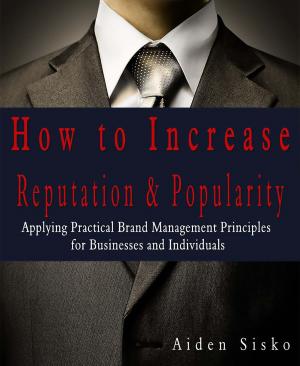The Fine Art of Decision Making: Make Things Happen By Making The Right Calls!
Business & Finance, Human Resources & Personnel Management, Skills, Management & Leadership, Decision Making & Problem Solving, Entrepreneurship & Small Business| Author: | Damon Lundqvist | ISBN: | 9781311971661 |
| Publisher: | JNR Publishing Group | Publication: | September 23, 2014 |
| Imprint: | Smashwords Edition | Language: | English |
| Author: | Damon Lundqvist |
| ISBN: | 9781311971661 |
| Publisher: | JNR Publishing Group |
| Publication: | September 23, 2014 |
| Imprint: | Smashwords Edition |
| Language: | English |
At the very heart of being a great, effective leader is the mastery of an invaluable and necessary skill: making sound judgment call which result in beneficial decisions. Without practicing and perfecting this ability, the one in the leadership position will never realize his or her full potential in the position they are in, or in any position above it.
Leaders who play an integral and productive role as they stand are able to remain calm, keep their thoughts in order, and push any temptation to react with emotion aside. They are able to make a quality decision under pressure and in the face of questionable circumstances without doubting themselves or second-guessing the choice they made. They remain consistently constant, even when the situation being dealt with appears to be nothing but chaos. They observe, assess, decide, and follow through to the end.
When taking leadership and decisions into joint consideration, it is easy to notice the fact that there are those in positions of authority who simply do not possess the skills it takes to make effective judgments and choices. On the flip side, others seem to not only make decisions with ease, they do it well, applying wisdom, considering the potential outcomes, and acting accordingly. A leader of quality has already mapped out his life and career strategy, and is working at it consistently. They are prepared to handle the dilemmas which present themselves, and they have practiced using a calm affect to their advantage. They have designed a solidified a blue print and are applying methods daily to stay within the structure intended.
=================
TABLE OF CONTENTS
=================
The Art of Making Superior Judgment Calls
Aspect I: Sources
Educated Knowledge of Stakeholders
Draw in Members of the Board for Training & Workshops
Contribute to your Community while Conducting Business
Consider Human and Environmental Capital
Get your Council in on the Action
Training Academies and Seminars
External & Internal Stakeholder Council
Groups in the Community
Customers or Clients
Groups with Special Interest
Supply Providers
Agencies which Establish and set Regulations
Those Partnering Corporately
Associations with other Industries
Those with Investment Interests
Union Organizations
Aspect 2: Time
Step 1: Preparation
Step II: Making the Call
Step III: The Follow Through
You must have Exceptional Integrity & Profound Courage
The Use of Visualization when making Decisions
You will Encounter “Re-dos”
Aspect III: Area of Domain
Strategic Judgment Calls
Tell a Great Story
Where are we at now?
Where do we want to go?
What method of transportation are we using to get there?
Be “Teachable”
Gather information
Decide
Follow through
Step One: Gathering Information
Step Two: Decide
Step Three: Follow Through
Strategies for use with Individuals
Emotions
People carry around what is said to them
Human Dynamics
Preparation when dealing with people
Decide on the call you are making
Follow through
Making Decisions during Crises
Commit to use the crisis for good.
Have a team ready.
Keep a teachable perspective and have a story ready to go
At the very heart of being a great, effective leader is the mastery of an invaluable and necessary skill: making sound judgment call which result in beneficial decisions. Without practicing and perfecting this ability, the one in the leadership position will never realize his or her full potential in the position they are in, or in any position above it.
Leaders who play an integral and productive role as they stand are able to remain calm, keep their thoughts in order, and push any temptation to react with emotion aside. They are able to make a quality decision under pressure and in the face of questionable circumstances without doubting themselves or second-guessing the choice they made. They remain consistently constant, even when the situation being dealt with appears to be nothing but chaos. They observe, assess, decide, and follow through to the end.
When taking leadership and decisions into joint consideration, it is easy to notice the fact that there are those in positions of authority who simply do not possess the skills it takes to make effective judgments and choices. On the flip side, others seem to not only make decisions with ease, they do it well, applying wisdom, considering the potential outcomes, and acting accordingly. A leader of quality has already mapped out his life and career strategy, and is working at it consistently. They are prepared to handle the dilemmas which present themselves, and they have practiced using a calm affect to their advantage. They have designed a solidified a blue print and are applying methods daily to stay within the structure intended.
=================
TABLE OF CONTENTS
=================
The Art of Making Superior Judgment Calls
Aspect I: Sources
Educated Knowledge of Stakeholders
Draw in Members of the Board for Training & Workshops
Contribute to your Community while Conducting Business
Consider Human and Environmental Capital
Get your Council in on the Action
Training Academies and Seminars
External & Internal Stakeholder Council
Groups in the Community
Customers or Clients
Groups with Special Interest
Supply Providers
Agencies which Establish and set Regulations
Those Partnering Corporately
Associations with other Industries
Those with Investment Interests
Union Organizations
Aspect 2: Time
Step 1: Preparation
Step II: Making the Call
Step III: The Follow Through
You must have Exceptional Integrity & Profound Courage
The Use of Visualization when making Decisions
You will Encounter “Re-dos”
Aspect III: Area of Domain
Strategic Judgment Calls
Tell a Great Story
Where are we at now?
Where do we want to go?
What method of transportation are we using to get there?
Be “Teachable”
Gather information
Decide
Follow through
Step One: Gathering Information
Step Two: Decide
Step Three: Follow Through
Strategies for use with Individuals
Emotions
People carry around what is said to them
Human Dynamics
Preparation when dealing with people
Decide on the call you are making
Follow through
Making Decisions during Crises
Commit to use the crisis for good.
Have a team ready.
Keep a teachable perspective and have a story ready to go















